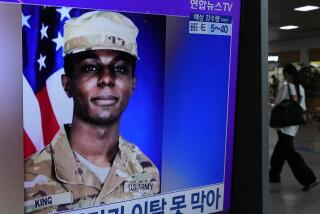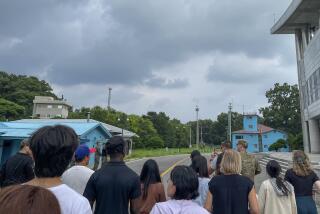Happy Ending to a Tense Episode : U.S. pressure and tact pay off in release of pilot
- Share via
The diplomatic standoff between the United States and North Korea over the Dec. 17 helicopter incident has been satisfactorily resolved, happily before it could spiral into a needless political crisis.
Chief Warrant Officer Bobby Hall, the pilot of the craft that was downed when it intruded into North Korean airspace, has been returned after negotiations in Pyongyang between Deputy Assistant Secretary of State Thomas Hubbard and officials of the reclusive Stalinist state. Earlier the North Koreans had returned the body of co-pilot David Hilemon, killed when the helicopter crashed.
The United States, which from the beginning expressed regret over the inadvertent violation of North Korea’s sovereignty, formally did so again as an apparent precondition to Hall’s release.
North Korea, whose official news agency had several times alleged that the helicopter was on a spying mission, chose not to press that claim. Instead it produced a seven-page purported confession from Hall acknowledging only that his craft had entered North Korean airspace and asking for forgiveness and leniency for his “inexcusable and unpardonable” action. The document’s stilted language and abject tone clearly indicated it had been dictated. The request for leniency was a tip-off that the stage had been set for Pyongyang to show its magnanimity by freeing the American.
It clearly helped that President Clinton, in public and presumably in diplomatic exchanges as well, signaled his growing impatience with North Korea’s foot-dragging.
It certainly also helped that voices were raised both in the Administration and in Congress warning that the deal struck earlier to supply North Korea with two nuclear reactors and fuel oil would be jeopardized unless the helicopter incident was quickly resolved.
North Korea had plenty of time presumably to examine the helicopter’s wreckage and note that it carried no spying equipment. Common sense in any event should have made clear that in the era of spy satellites and intrusive electronic eavesdropping, a noisy helicopter on a daylight flight along the world’s most tightly guarded border is hardly an effective or necessary way to conduct espionage.
Incidents of this kind are always scrutinized afterward to see what lessons can be learned from them. The lesson is this instance seems to be that the Clinton Administration’s evident firmness of purpose and non-inflammatory public statements in a case where it was clear that no ill purpose had been intended paid off.
It may also have helped--just maybe--that whoever is now running things in North Korea really isn’t interested at this time in provoking a new crisis.
More to Read
Sign up for Essential California
The most important California stories and recommendations in your inbox every morning.
You may occasionally receive promotional content from the Los Angeles Times.










